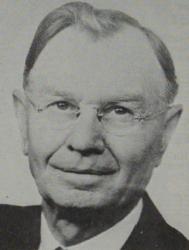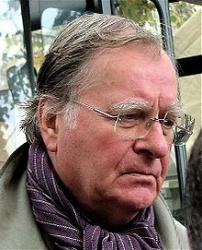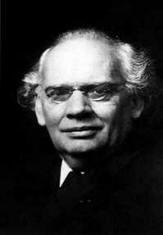Planning worship?
Check out our sister site, ZeteoSearch.org,
for 20+ additional resources related to your search.
- |
User Links
Person Results
Jaime Cortez
b. 1963 Person Name: Jaime Cortez, n. 1963 Scripture: Luke 9:18-29 Author of "Quién Dicen Que Soy Yo/Who Do You Say That I Am" in Flor Y Canto (2nd ed.)
Jaime Cortez
Thomas S. Cobb

1876 - 1942 Person Name: T. S. C. Scripture: Luke 6:38-49; 7; 8; 9; 10, 11:1-41 Author of ""Go," "Pray," "Give"" in The New Wonderful Songs for Work and Worship Thomas S. Cobb (1876-1942), a native Texan, was educated in much the same circles as [Austin] Taylor, and received his music diploma from the Western Normal and College of Music in Dallas. He taught singing schools across Texas and the bordering states, and was particularly noted for the "Cobb Quartet" made up of his four daughters. He was recruited to Firm Foundation by Showalter in 1935.(Finley, 122ff.) Cobb edited only four hymnals for Firm Foundation before his death in 1942, but among these was the significant New Wonderful Songs (1933); at 296 hymns it was part of the trend toward more substantial publications.
Prior to his work with Firm Foundation, Cobb edited hymnals for the Quartet Music Company of Fort Worth, Texas. A search of WorldCat.org shows that he was involved with at least 7 books for this publisher, going back as far as the 1890s when it was called the "Quartette Company." One of these earlier works From the Cross to the Crown (1921?) was subtitled, "Scriptural Songs," and was co-edited with Elder T. B. Clark and T. B. Mosley, one of the most well-known singing school teachers among the Churches of Christ in the southeastern U.S. Mosley was also known as a staunch doctrinal conservative. This gives some idea of the bona fides Cobb brought with him during the era of the "hymnal controversy" surrounding E. L. Jorgenson's Great Songs of the Church. Jorgenson was firmly in the premillennial camp, and was an editor of Word and Work, the primary voice of this viewpoint within the Churches of Christ. Opponents of premillennialism objected to several hymns in Great Songs that supported this doctrine, or were at least questionable. (Most of these were removed or altered in the better-known "No. 2" edition).
Thomas S. Cobb passed from this life in 1942, shortly after the last of the pre-war Firm Foundation hymnals appeared.
--drhamrick.blogspot.com/2012/01/hymnals-published-by-firm-foundation.html
Thomas S. Cobb
Huub Oosterhuis

1933 - 2023 Person Name: Huub Osterhuis, 1933- Scripture: Luke 9:28-36 Author of "You Have Passed By" in Common Praise (1998) Hubertus Gerardus Josephus Henricus Oosterhuis (born 1 November 1933, Amsterdam) is a controversial Dutch theologian and poet. He is mainly known for his contribution to Christian music and liturgy in the Dutch language, used in both Protestant and Roman Catholic churches, although there is much Catholic opposition to his work, which has resulted in the banning of several songs in certain dioceses. He is the author of over 60 books and at the time of over 700 hymns, songs, Psalms (often in an own interpretation), and prayers.
Oosterhuis was a Jesuit and is a Roman Catholic priest.
In 1954, inspired by Che Guevara who said that churches have the potential to transform the social structure of society, Oosterhuis combined his priesthood with political activism.
In 1965, Oosterhuis became one of the major supporters of ecumenism, following the modernist interpretation of the Second Vatican Council. He started out to rewrite the liturgy and make it acceptable to all. Some of his changes were considered controversial within the Roman Catholic Church especially writing the prayer for agnostics: "Heer, als U bestaat, kom dan onder ons" ("Lord, if You exist, come amongst us").
His political views, the conflicts regarding the liturgy and his dismissal of celibacy led to Oosterhuis being expelled from the Jesuit order in 1969. He still however remained working as a priest, running his church in Amsterdam out of the responsibility of a bishop, at the time for about forty years. He is still focussed on writing liturgy, poetry and essays.
Back in the sixties and seventies his liturgical texts were put to music by his fellow former Jesuit Bernard Huijbers (1922–2000). The co-operation between Oosterhuis and Huijbers ended. The last engaged himself more and more in a 'spirituality-without-God' or '-Thou', whereas the former kept to his biblical prayers, hymns, psalms. After they both split up and Huijbers moved to the South of France Oosterhuis' main composers were two of Huijbers' pupils, Antoine Oomen (born 1945) and Tom Löwenthal (born 1954).
Oosterhuis founded the discussion center "De Rode Hoed" ("The Red Hat") in Amsterdam in 1989. The building was a former Remonstrant shelter church, hidden because Remonstrantism was outlawed in the 17th century. The building was more or less deserted at the time. Oosterhuis wanted to use it for his student organization (1990) and create a discussion center. Its nice interior made it also very suitable for TV-shows. After a short period Oosterhuis was replaced by a managing-director for a more commercial exploitation of this prominent building in Amsterdam's Canal zone.
In 2002 Queen Beatrix of the Netherlands asked him to deliver the eulogy at the funeral of her Prince-Consort Claus von Amsberg, a longtime personal friend. The New Church in Delft was packed with heads of state, high dignitaries, forming an unexpected audience. That same week the Protestant VU University in Amsterdam granted Oosterhuis an honorary PhD (or Doctorate) in Theology.
It was at De Rode Hoed where André van der Louw announced his Social Democratic Renewal Program which was an incentive to reform the Labour Party. Oosterhuis ultimately choose the lesser known Socialist Party as he viewed it closer to socialist ideals. He also opined that The Socialist Party is closer to the social ethics of the Bible than many Christian parties."
In 2006 elections Oosterhuis stood as final candidate, a symbolic position, for the Socialist Party.
Oosterhuis translated the Torah together with Alex van Heusden, which was released in five separate books, as an attempt to translate the first five books of the Bible as close to contemporary Dutch as possible without losing the style figures of the original Hebrew text.
Huub Oosterhuis is the father of the musicians Trijntje Oosterhuis and Tjeerd Oosterhuis.
Only a very few books, poems, verses of Huub Oosterhuis were translated into English: Fifty Psalms, Your Word is Near, At Times I See, The Children of the Poor Man, Wake Your Power (CD) - some more.
--en.wikipedia.org/wik
Huub Oosterhuis
Redmond McGoldrick
b. 1900 Person Name: Redmond McGoldrick, 19??- Scripture: Luke 9:28-36 Translator of "You Have Passed By" in Common Praise (1998)
Redmond McGoldrick
Thoinot Arbeau
1519 - 1595 Person Name: Thoinot Arbeau, 1520-1595 Scripture: Luke 9:28-36 Composer of "PIEDS EN L'AIR" in Common Praise (1998) Birth name: Jean Tabourot. Used Thoinot Arbeau
Thoinot Arbeau
Bernard Huijbers

1922 - 2003 Person Name: Bernard Huijbers, 1922- Scripture: Luke 9:28-36 Harmonizer of "PIEDS EN L'AIR" in Common Praise (1998) Bernard Huijbers (1922 - 2003), a native of Holland, was one of the leading composers of contemporary liturgical music. Approximately 200 works have resulted from his collaboration with Huub Oosterhuis, the well-known Dutch poet and liturgist.
A former Jesuit, Huijbers studied under Ernest Mulder during his Jesuit course of studies, receiving the state certificate for musical theory in 1951. Later, he studied at the Arnsterdam Conservatory and received the certificate for school music in 1960. He served as senior master of school music and choirmaster at St. Ignatius College, Amsterdam, until 1969. Afterwards, he served as composer, choir director and liturgical team member at St. Dominic's parish in Amsterdam.
His development as composer and choir director can be traced through a list of his principal musical activities. While studying under Mulders, he directed performances of Palestrina’s Missa Lauda Sion, Brevis and Papae Marcelli. He composed a Missa Matris Dei and Cantus Organi (1950), and Four Marion Anthems for a four-to-eight voice male choir (1949 - 51). During his theological studies, he published a Te Deum and an Organ Suite (1954 - 55).
After 1956, performances of religious masterpieces by Schütz, Purcell and Buxtehude led to the first liturgical experiments, culminating in a Dutch-language Passion According to St. John in 1959.
In 1961, Huijbers was among the founders of the Student Work Group for a Vernacular Liturgy in Amsterdam, which evolved into the independent Foundation for a Vernacular Liturgy, through which Huijbers and Oosterhuis released their joint efforts.
After 1961, Huijbers composed a wealth of material, and eleven Dutch music collections of the Huijbers/Oosterhuis material have been released, including Turn Your Heart to Me and Wake Your Power, published by OCP. His widely acclaimed book, The Performing Audience, examines the scope and direction of renewal in liturgical music (Pastoral Press).
Huijbers believed that liturgical music must be simple, that the assembly must be viewed as a "performing audience" and that the music must bring life to what it celebrates. Huijbers' work as composer and choir director reflects his years of close contact with people throughout Europe and in the United States.
--www.ocp.org/artists
Bernard Huijbers
Julius Röntgen

1855 - 1932 Scripture: Luke 9:28-36 Arranger of "IN BABILONE" in Lift Up Your Hearts An important Dutch pianist, composer, conductor, scholar, and editor, Julius Rontgen (b. Leipzig, Germany, 1855; d. Utrecht, the Netherlands, 1932) studied music in Leipzig with well-known German teachers. In 1877 he moved to Amsterdam, where he first taught at the Amsterdam Conservatory. In 1886 he became conductor of the Society for the Advancement of Musical Art. He returned to the Conservatory as director in 1918, and then retired in 1924 to devote himself to composition. He was a friend of leading composers of his day, including Liszt, Brahms, and Grieg, and wrote a biography of Grieg. Rontgen's compositions include symphonies, chamber works, operas, and film scores.
Bert Polman
Julius Röntgen
Ludwig van Beethoven

1770 - 1827 Person Name: Ludwig van Beethoven, 1770-1827 Scripture: Luke 9:28-45 Composer of "HYMN TO JOY" in New Wine In Old Wineskins A giant in the history of music, Ludwig van Beethoven (b. Bonn, Germany, 1770; d. Vienna, Austria, 1827) progressed from early musical promise to worldwide, lasting fame. By the age of fourteen he was an accomplished viola and organ player, but he became famous primarily because of his compositions, including nine symphonies, eleven overtures, thirty piano sonatas, sixteen string quartets, the Mass in C, and the Missa Solemnis. He wrote no music for congregational use, but various arrangers adapted some of his musical themes as hymn tunes; the most famous of these is ODE TO JOY from the Ninth Symphony. Although it would appear that the great calamity of Beethoven's life was his loss of hearing, which turned to total deafness during the last decade of his life, he composed his greatest works during this period.
Bert Polman
Ludwig van Beethoven
Edward Hodges

1796 - 1867 Person Name: Edward Hodges, 1796-1867 Scripture: Luke 9:28-45 Arranger of "HYMN TO JOY" in New Wine In Old Wineskins Born: July 20, 1796, Bristol, England.
Died: September 1, 1867, Clifton, Bristol, England.
Buried: Church of St. Mary the Virgin, Stanton Drew (about eight miles south of Bristol).
Hodges’ musical gift showed itself at an early age; by 1819, he was playing the organ at St. James’ Church in Bristol, and at St. Nicholas’, 1821-1838. He also had an interesting mechanical bent, and spurred several technical improvements in organ design. He composed a number of services and anthem pieces, and Cambridge University awarded him a doctorate in music in 1825.
Hodges eventually emigrated, accepting a post at the cathedral in Toronto, Canada, in 1838. The next year, he became music director at Trinity Parish in New York City. He became the organist at Trinity Church when it opened in 1846 (the church had its organ built to his specifications). He retired for health reasons in 1859, and returned to his native England in 1863. Hodges’ works include:
An Apology for Church Music and Musical Festivals, in Answer…to the Standard and the Record (London: 1834)
Essays on the Objects of Musical Study (Bristol, England: 1838)
An Essay on the Cultivation of Church Music (New York: 1841)
Contributions to the Quarterly Musical Magazine & Musical World
Trinity Collection of Church Music (Boston, Massachusetts: 1864) (editor)
Music--
BRISTOL
GLOUCESTER
HABAKKUK
HYMN TO JOY
--www.hymntime.com/
Edward Hodges
Carolyn Winfrey Gillette

b. 1961 Scripture: Luke 9:28-36 Author of "O Lord, As You Were on Your Way" in Songs of Grace Carolyn Winfrey Gillette has been a pastor in rural, small town, suburban, and city churches; she has also served as a hospice chaplain, a hospital chaplain, and a school bus aide helping children with special needs. She and her husband Bruce are pastors of the First Presbyterian Union Church in Owego, NY.
Carolyn is a gifted hymn writer who has written over 400 hymns. These hymns have been sung by congregations throughout the United States and around the world — from the Washington National Cathedral to St. Giles' Cathedral in Edinburgh, Scotland to St. George's Cathedral in Cape Town, South Africa to small town churches and small household congregations; they have also been sung at national church and international ecumenical meetings.
She has written four books: "I Sing to My Savior: New Hymns from the Stories in Luke's Gospel", "God's World is Changing: New Hymns for Advent and Christmas", "Gifts of Love: New Hymns for Today's Worship" (Geneva Press) and "Songs of Grace: New Hymns for God and Neighbo"r (Upper Room Books). Her hymns have been published in over 20 books. Two of her hymns have been published by the Choristers Guild as anthems. Carolyn was commissioned to write the lead article for the special issue on "Singing Our Lives" for Baylor University's "Christian Reflectio"n journal. Her hymns have also been in "Call to Worship" journal, "The Chorister" (cover story), "Reformed Worship," "The Presbyterian Outlook" and posted on thousands of web sites. All of her hymns can be found on her website with indices to scriptural references, topics, tunes, and the three-year cycle of the Revised Common Lectionary: http://www.carolynshymns.com
The World Council of Churches, National Council of Churches, Church World Service and Churches Uniting in Christ have asked her to write hymns. Habitat for Humanity International used a hymn by Carolyn for their 30th anniversary celebration. Family Promise (Interfaith Hospitality Network) did a music video of her hymn for their ministry with homeless families. The Humane Society of the United States did a music video contest of her hymn for their Blessing of the Animals service. The Presbyterian Church (USA) 216th General Assembly presented her with the "Ecumenical and Interreligious Service Recognition." Sojourners did a short video about her hymn writing. A Canadian scholar wrote her biography for the "Cambridge Dictionary for Hymnology."
Feature stories about Carolyn's hymns addressing concerns facing the Church, nation and world, were done by The New Yorker, The Christian Century, America, National Public Radio, national PBS-TV, and newspapers (Philadelphia Inquirer, Washington Post, New Jersey Courier Post, Delaware News Journal, and others).
Carolyn is a graduate of Lebanon Valley College and Princeton Theological Seminary. She finds joy in parish ministry, hymn writing, and most of all in her family as a wife, mother (and foster mother), grandmother, sister, and human parent to a rescue dog, "Annie."
Carolyn sees her hymn writing as a partnership and is very grateful for prayers for her hymn writing, suggestions for hymns, gifts for hymn use and commissions, and invitations to speak at conferences, workshops, and church gatherings (in person and online). She hopes her hymns nurture people in their discipleship and support churches in their worship and service in the world. Sing to the Lord a new song!
Copied from "About the Author" in "I Sing to My Savior: New Hymns from the Stories in Luke's Gospel."
Email from Bruce Gillette
Carolyn Winfrey Gillette


 My Starred Hymns
My Starred Hymns


